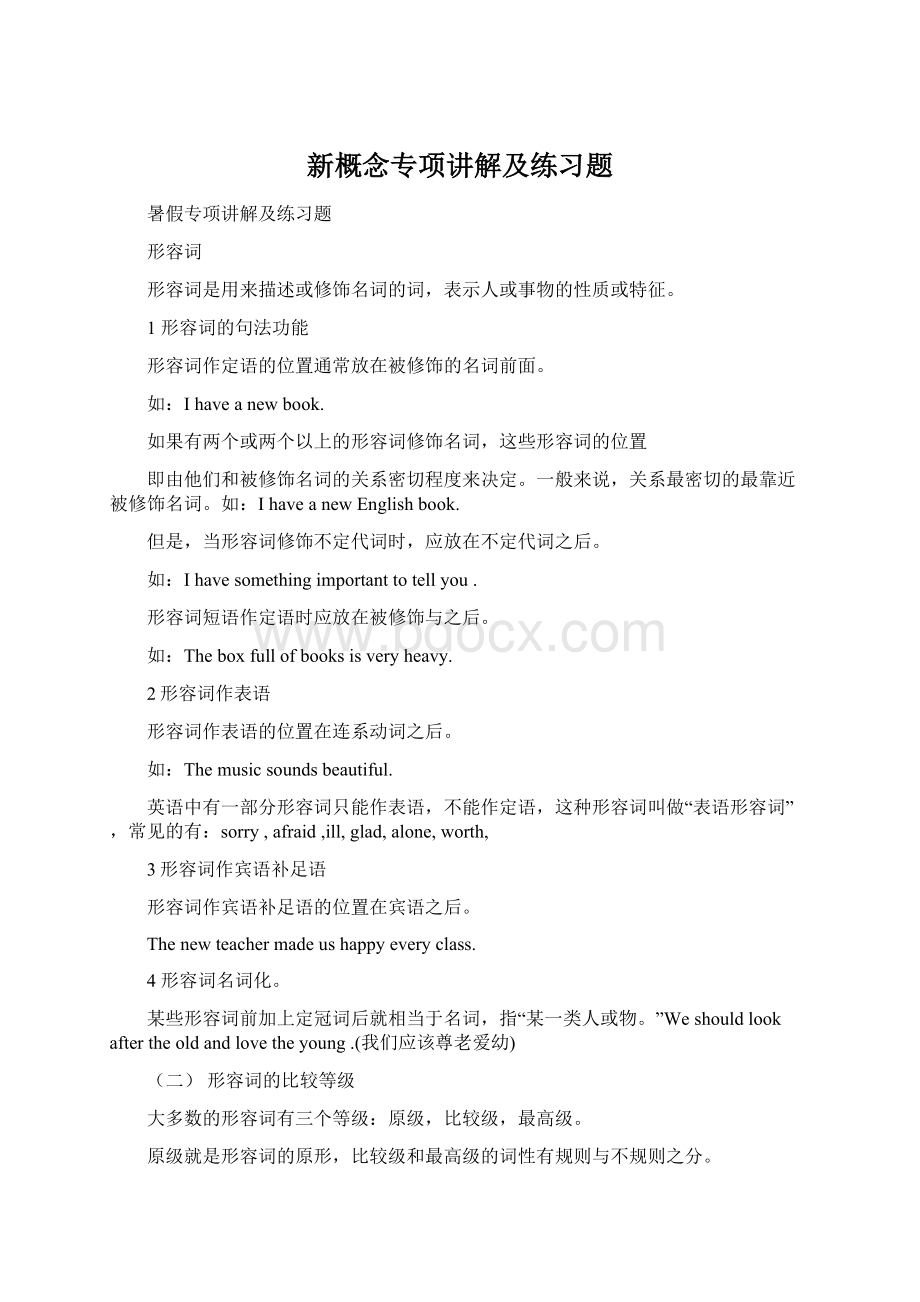新概念专项讲解及练习题.docx
《新概念专项讲解及练习题.docx》由会员分享,可在线阅读,更多相关《新概念专项讲解及练习题.docx(12页珍藏版)》请在冰豆网上搜索。

新概念专项讲解及练习题
暑假专项讲解及练习题
形容词
形容词是用来描述或修饰名词的词,表示人或事物的性质或特征。
1形容词的句法功能
形容词作定语的位置通常放在被修饰的名词前面。
如:
Ihaveanewbook.
如果有两个或两个以上的形容词修饰名词,这些形容词的位置
即由他们和被修饰名词的关系密切程度来决定。
一般来说,关系最密切的最靠近被修饰名词。
如:
IhaveanewEnglishbook.
但是,当形容词修饰不定代词时,应放在不定代词之后。
如:
Ihavesomethingimportanttotellyou.
形容词短语作定语时应放在被修饰与之后。
如:
Theboxfullofbooksisveryheavy.
2形容词作表语
形容词作表语的位置在连系动词之后。
如:
Themusicsoundsbeautiful.
英语中有一部分形容词只能作表语,不能作定语,这种形容词叫做“表语形容词”,常见的有:
sorry,afraid,ill,glad,alone,worth,
3形容词作宾语补足语
形容词作宾语补足语的位置在宾语之后。
Thenewteachermadeushappyeveryclass.
4形容词名词化。
某些形容词前加上定冠词后就相当于名词,指“某一类人或物。
”Weshouldlookaftertheoldandlovetheyoung.(我们应该尊老爱幼)
(二)形容词的比较等级
大多数的形容词有三个等级:
原级,比较级,最高级。
原级就是形容词的原形,比较级和最高级的词性有规则与不规则之分。
1形容词的比较级和最高级的构成
(1)规则变化(单音节和部分双音节词)
a一般在词尾加er或est
b以e结尾的只加r或st
c以一个辅音字母结尾的重读闭音节词,先双写这个辅音字母再加er或est
d以“辅音字母+y”结尾的,先变y为I再加er或est
多音节和部分双音节在词前加more或most
(1)不规则变化
good/well-better-bestbad/ill/badly-worse–worst
littlemany/much-
farold–elder-elder(年长的)
2形容词比较等级的用法
(1)同级比较用法
英语中同级比较句型常用的有两种:
as+形容词原级+as和notso(as)形容词原级+as…句型。
如:
Theboxisasheavyasthatone.
(2)比较级的用法
形容词比较级用于表示两者或两部分之间进行比较。
常用为“形容词比较级+than”
如:
Theflowersaremorebeautifulthanthoseonthedesk.
使用中,常在比较级前用much,even,yet,still,alittle,abit,alot等词进行程度上的修饰。
如:
Mydaughterisalittletallerthanhis.
要表示“…比…多…倍”,用“倍数+比较级+than”句型来表达。
Thesunisamilliontimeslargerthantheearth.
英语中还有两个重要的句型使用比较级:
表示“越来越…”使用“比较级+比较级”句型;表示“越…就越…”使用“the+比较级,the+比较级”句型。
如:
Itgetshotterandhotter.
Themorecarefulyousee,thelessmistakesyou’llmake.
在比较中,还要注意参与比较的两者或不能互相包含。
如:
I’mbetterinEnglishthananystudentsinourclass.(错误。
因为我也是我们班的学生之一,我不能比自己好。
)
I’mbetterinEnglishthananyotherstudentinourclass(正确)
(3)最高级的用法
最高级用于表示三者或三者以上的多数之间进行比较,最高级前面要加定冠词,后面一般要跟表示范围的表达。
如:
TheGreatWallisthelongestwallinourclass.
使用中我们还要用到这样的表达:
“最…之一”;“第几…最…”;在最高级前进行程度修饰等,我们可以用“oneof+the+最高级”,“the+序数词(very等置于the之后)+最高级”或用much,even等词(置于the之后)来修饰。
Mrsmartisoneofthemostpopularteachersinourschool.
(一)副词
副词用来修饰动词,形容词,其他副词或全句,说明时间,地点,程度及方式。
副词的构成
1本身就是副词的词:
nowoftenalwaysneververy
2由形容词加ly转化而来的副词careful-carefullypolite–politely
true-trulyfull–fullyangry-angrilyhappy-happilydry-dryly
副词的句法功能
(1)作状语,Igotoschoolveryearlyeveryday.
(2)作定语Thepeoplehereareveryfriendly.
(3)作表语Classisover.
(4)作宾语补足语Pleaseletmein.
副词在句中的位置
(1)修饰动词,一般放在动词之后,如是及物动词,则放在宾语之后。
Pleaselistentomecarefully.
(2)频度副词一般放在行为动词之前,情态动词,助动词和be动词之后。
Heoftengoestoworkonfoot.
(3)句中同时出现时间,地点的副词作状语时,先地点,后时间。
Hearrivedhereyesterday.
(4)副词enough通常放在形容词或副词之后。
Theboyisn’toldenoughtogotoschool.
1also,too,either表示“也”的区别用法
(1)also比较正式,只能用于肯定句中,一般放在句中。
(2)too多用于口语中,只能用于肯定句中,一般放在句尾,前面用逗号分隔开来;
(3)either只能用于否定句中,一般置于句末,并用逗号隔开。
2muchtoo/toomuch
muchtoo用于修饰形容词或副词toomuch用于修饰名词。
3howlong,howoften,howsoon
(1)howlong既可以用于对物的长度提问,表示“多长”,也可以用于对时间段提问,表示“多久”“多长时间”
(2)howoften用来对频度提问,表示“每隔多久”
howsoon是用来询问“过多久”某动作发生。
练习:
( A )1Bobneverdoeshishomework_____Mary.Hemakeslotsofmistakes.
Asocarefulas Bascarefullyas Ccarefulas Dascarefulas
( A )2Ifeel____betterthanyesterday. Amore Bvery C the Dfar
( B )3Chinahasalargerpopulationthan____intheworld.
Aallthecountries Beverycountry Canycountry Danyothercountry
( C )4Thisbookis____onthesubject.
Athemuchbest Bverymuchbest Cmuchthebest Dverythebest
( C )5Thesickboyisgetting____daybyday.
Aworse Bbad Cbadly Dworst
( B )6Thissweaterlooks____andsells___.
Awell,well Bgood,nice Cnice,good Dnice,well
( A )7Thesmileonmyfather’sfaceshowedthathewas____withme.
Asad Bpleased Cangry Dsorry
( D)8Ididn’tgoshoppingyesterday.Hedidn’t,___. Aso Beither Ctoo Dneither
( B )9_____deliciousthefoodis!
AHow BHowa CWhat DWhata
( D)10---------Whatanimalsdoyoulike____?
---------Ilikepandas.
A.better Bbest Cvery Dwell
( B )11Itis____coldtoday. Amuch Bverymuch Cmuchtoo Dtoomuch
( B )12Rememberthis.,children.______carefulyouare,____mistakesyouwillmake.
----Weknow,MissGao.
AThemore,themore BThefewer,themore CThemore,thefewer DTheless,theless
( A )13.Wearegoingtodoourworkbetterwith_______moneyand______people.
A.less,fewer B.less,less C.fewer,fewer D.fewer,less
( D )14.Theboyis________thanhisbrother.
A.twoyearsolder B.twoyearselder C.two-yearolder D.two-yearelder
( C)15.Onthemoon,thingsaren’t________theyareontheearth.
A.soheavyas B.asheavieras C.asheavythan D.heavythan
( A )16.Tomisthebeststudentinhisclass.Heis_______thananyofhisclassmates.
A.morecleverer B.muchcleverer C.muchmorecleverer D.muchclever
( C)17.Therearemanystudentsinthisclassroombutthereare________studentsinthatone.
A.many B.more C.much D.moremany
( D)18.Thereis________milkinmycupthaninyourcup. A.little B.less C.few D.fewer
( B )19.I’m1.70meters__________. A.high B.higher C.tall D.taller
( A )20.Thefilmis________,buttheoldaren’t_______init.
A.interesting,interested B.interested,interesting C.interesting,interesting D.interested,interested
( B )21.Fatheris_______togotowork.
A.goodenough B.enoughgood C.wellenough D.enoughwell
( A )22.Isthere________inthisbook?
A.somethinginteresting B.interestingsomething C.anythinginteresting D.interestinganything
( D )23.Ishishandwriting________ashers?
A.sogood B.sowell C.asgood D.aswell
( A )24.LuXunisoneof__________inChina.
A.bestwriters B.thebestwriter C.bestwriter D.thebestwriters
一、用括号内所给词的适当形式填空
1.TheNileisa______river.Itis_______thananyotherriverintheworld.Infactitis__________riverintheworld.(long)
2.Shesaidthatitwas_happiest_______(happy)dayinherlife.
3.Whois__tall______(tall),MaryorJoan?
4.Whichis__fast______(fast),abike,acarorabus?
5.Shanghaiisoneof__bigge_______(big)citiesinChina.
6.Mybrotherhasavery__good________(good)voice.
7.WangFanghas________ChineseStamps.Judyhasn’tgotas_________ChinesestampsasWangFang.Butshehasgot______AmericanstampsthanWangFang.(many)
8.Thisfilmiseven__interesting__(interesting)andit’s___good______(good)oneIhaveeverseen.
9.The___sick____(sick)boylooksmuch____tired______(tired).
10.Whensummercomes,thedaysaregettinglongest(long).
11.Thisshirtis__nicest(nice),butmymotherislookingfora_nicest(nice)oneforme.
12.Oh,I’mstill__shorter_______(short)thanyou.
13.IhaveonlyafewfriendsinNanjing,buthehasalittle___fewest____(few).
14.Mybikeisn’tas___goodest___(good)ashis.
15.LastSundaytherewasa_friendliest_(friendly)talkamongus.
暑期培训复习资料介词
1.与形容词搭配的词组有:
beafraidof(怕)beangrywith(生某人的气)
beawayfrom(不在某地)bedifferentfrom(与…不同)
begoodat(善于)begood/badfor(对…有益/有害)beinterestedin(对…感兴趣)belatefor(迟到)be/getreadyfor(为作好准备)besureof(对…有把握)
beworriedabout(为…感到担忧)
2.介词后常用人称代词宾格和动词-ing形式
1)Youmusttakegoodcareofher.2)Thankyouforteachingussowell.
3.几组易混淆的介词
A.“在...之后”in+一段时间(用于一般将来时)
after+一段时间(用于一般过去时)after+一点时间(常用于一般将来时)
如:
Thebabystoppedcryingafterhalfanhour.
Thebabywillstopcryinginhalfanhour.TheywillvisittheirteacherafterFriday.
B.for+一段时间since+过去的一点时间
这两者均用于现在完成时,具体在时态部分,我会继续向同学们讲解。
C.bemadeof"用……制成"bemadein“由某地制造”bemadebysomebody“由某人制成”
D.in,on,at表时间in“在某月(季节、年)等”eg:
in1996,inJanuary,insummer
固定词组:
inthemorning,inaweek,inaminute,intime,intheend
on"用于指具体的某一天或专指某一天上午、下午或晚上等"
eg:
onChristmasDay,onthenightofFebruary16
at“用于具体时刻前和某些固定词组中”
固定词组:
atseven,atthemoment,atnight,atlast,atfirst,atnoon,attimes,atonce,atthistimeoftheyear,atthebeginningof,attheendofthismonth,atthesametime注意:
在表时间里,下列情况下一般不用介词。
词组里有:
next,last,this,that,tomorrow,yesterday,one,every,all以及thedaybeforeyesterday和thedayaftertomorrow前不用介词。
如:
不能说intomorrow,只能说tomorrow在明天
E.except+宾格/doingsomething"除…之外”(不包括本身)
EveryoneisatschooltodayexceptLinTao.(同义句转换)=OnlyLinTaoisn'tatschooltoday.
F.“用”通过交通工具byplane
用语言inEn